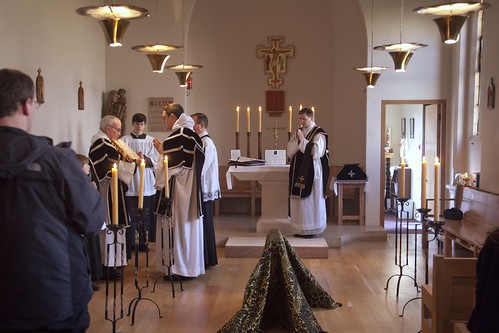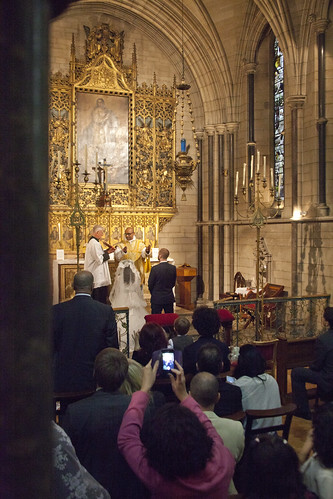 |
| The solemn proclamation of the Gospel at a Traditional Requiem Mass. |
In Remaining in the Truth of Christ (the 'book of the five Cardinals' defending the Church's discipline on marriage), the biblical data on divorce is ably discussed by Fr Paul Mankowski SJ. He remarks laconically that today people who uphold Our Lord's teaching on divorce are accused of being 'unmerciful', hard of heart, but Jesus tells us of the permission for divorce in the Mosaic law (a permission never made explicit, no more than a reference to the fact that people were divorcing):
'It was for your hardness of heart [Greek: 'sklerocordia'] that Moses gave this commandment.' (Matthew 19:8)
It was because Jesus wants to break through that hardness of heart, because he offers, to use the phrase of Ezekiel (36:26) to replace our heart of stone with a heart of flesh, that he wants to put a stop to divorce, or at least the respectable re-marriage to another spouse which is the hard-hearted intention of most divorces.
One of the reasons that the Church is finding it difficult to hold the line on divorce is that, if we are honest with ourselves, the teaching on the indissolubility of marriage has not been presented with forcefulness for half a century at least. The Church is full of compassion for those who are going through marital difficulties, for the separated, for the divorced, and for the remarried. That is a good thing. But we aren't sent simply to weep by the sidelines; the Church is supposed to have some insight into human nature. What are these people told to do? Are they told that divorce and remarriage, as a solution for marital problems, overwhelmingly often has catastrophically bad consequences for both spouses and even more so for the children? Are they told that the marriage vow imposes a sacred obligation to remain with one's spouse, that the grace of the sacrament will assist with the common life of marriage, and that infidelity is poison to the life of grace and to the marital relationship?
I know that there are some priests, some catechists and people doing marriage preparation, and some theologians writing on these matters, who do say these things, but they need to say them more loudly if they want to be heard over the din of the values and customs of the World. The message that a lot of Catholics hear is that many divorces can be 'sorted out' with the help of a little canon-law jiggery pokery (perhaps, jiggery-popery).
What we need to bear in mind is that the line taken by the world is that married people can divorce if they consider themselves unhappy. How dreadful, the wordlings say, to be 'trapped in a loveless marriage': 'loveless', by which they do not mean abusive, intolerable, or invalid, or a marriage where the spouse refuses to have children or insists on aborting them, where the spouse is an alcoholic or a criminal, or anything life that. A marriage can, and perhaps should, be destroyed, the World informs us, if it doesn't make one of the spouses happy, which is understood as meaning that it fails to deliver that romantic tingle which is everyone's inalienable right.
Remarriage, of course, is the whole point of such divorces: not physical separation from a wife-beating maniac for the sake of the children (perhaps followed by recourse to civil divorce to enforce the just distribution of assets): no, legal separation from a nice but boring spouse for marriage with the glamorous alternative who will, it is hoped, fulfill one's dreams.
Denying a core doctrine of the World always takes a bit of effort, a courageous moral effort and an effort of proclamation to get the message across. I ask again, do Catholics and non-Catholics understand clearly that the Church condemns utterly this worldly thinking? That it is what Our Lord and Merciful Saviour called hardness of heart? Or are we inclined to sympathise publicly with the divorcing party and tell him or her how glad we are when, as it may appear, he or she has at last 'found happiness'?
There are some indications that the latter is more the case. On a blog by an Evangelical concerned to defend marriage I found a some pretty shocking examples of responses to questions on the 'Catholic Answers' website, which completely failed to take the opportunity presented to remind enquirers of the beautiful teaching of the Church, and of Christ, on marriage, and which suggest a deep reluctance to oppose the teaching of the World. There is more to the Church than Catholic Answers, I know, but it is a straw in the wind.
 |
| The Blessing of Bride and Groom in the Traditional Nuptial Mass. |
It is not enough to keep repeating that the Church 'officially' sees marriage as for life; the same sentiment is written up in the UK's Registry Offices. Everyone regards marriage as being, officially, ideally, 'for life'; the interesting question is about the possibility of trading up: getting a better spouse, often having enjoyed the flower of the first wife's youth, or continuing to enjoy the flower of the first husband's money. Do we regard this as utterly abominable, in the same class as other kinds of sexual abuse and economic enslavement? Do we say loudly and clearly that this is unjustified, always and everywhere?
Even when the party at issue tells us it was done for the sake of happiness? For that romantic tingle which, the World says, is the key to the meaning of life?
If we are going to deny this, friends, we need to do so loudly enough to be heard.